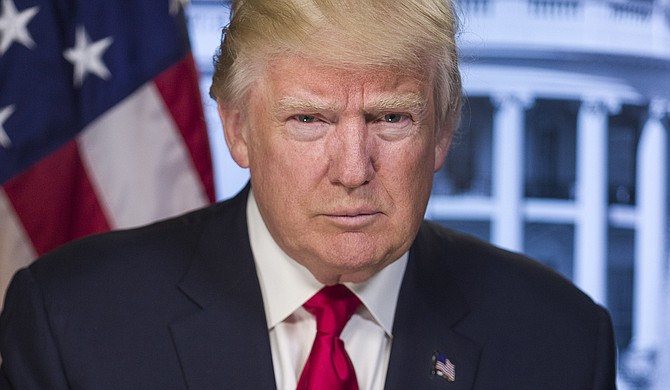President Donald Trump said he has told the leaders of Mexico and Canada that he will not pull out of the North American Free Trade Agreement at this time, but could still withdraw if he concludes a renegotiated pact is not "a fair deal for all." Photo courtesy Whitehouse.gov
WASHINGTON (AP) — President Donald Trump said he has told the leaders of Mexico and Canada that he will not pull out of the North American Free Trade Agreement at this time, but could still withdraw if he concludes a renegotiated pact is not "a fair deal for all."
Trump tweeted early Thursday that he has agreed to remain a partner in the much-discussed trade agreement in calls he received from Mexican President Enrique Pena Nieto and Canadian Prime Minister Justin Trudeau. The White House released a statement late Wednesday saying only that Trump had assured the two leaders in phone conversations that the U.S. would not withdraw from NAFTA at this time.
In his Twitter post, Trump called America's relationships with the two hemispheric neighbors "very good" and said the prospects of a renegotiated deal are "very possible." But he also said that his consent to remaining in NAFTA for now is "subject to the fact that if we do not reach a fair deal for all, we will then terminate NAFTA."
The White House statement said, "President Trump agreed not to terminate NAFTA at this time and the leaders agreed to proceed swiftly, according to their required internal procedures, to enable the renegotiation of the NAFTA deal to the benefit of all three countries."
The statement came hours after administration officials said Trump was considering a draft executive order to withdraw the U.S. from the deal — though administration officials cautioned it was just one of a number of options being discussed by the president and his staff.
Some saw the threat as posturing by Trump to gain leverage over Mexico and Canada as he tries to negotiate changes to the deal. Trump railed against the decades-old trade deal during his campaign, describing it as a "disaster."
Senior White House officials had spent recent days discussing steps that could be taken to start the process of renegotiating or withdrawing from NAFTA before the end of Trump's first 100 days in office, according to a person familiar with the president's thinking. But the person, along with an administration official, said a number of options remained on the table, and stressed discussions are ongoing about the best way to proceed.
Both spoke on condition of anonymity because they were not authorized to discuss internal deliberations.
White House Press Secretary Sean Spicer declined to comment on the order, which was first reported by Politico.
"The president has made addressing the problems of NAFTA a priority throughout the campaign, and once the president makes a decision about how he wants to address that, we'll let you know," he said.
The administration appeared divided Wednesday over how and when to proceed, as officials balanced a newfound cautiousness with the desire to rack up accomplishments before Trump's 100th day on the job.
Some were gunning for Trump to sign a draft order this week, while others were weighing complications surrounding withdrawing from or renegotiating the deal without Congress fully on board. The debate played out in the media Wednesday as some outlets quoted officials insisting the signing was imminent, while other officials dismissed the reports as "just a rumor."
"My practice is to comment on things we've actually done or are doing as opposed to commenting on rumors," Commerce Secretary Wilbur Ross told reporters at an unrelated White House briefing Wednesday evening.
Trump could withdraw from NAFTA — but he would have to give six months' notice. And it is unclear what would happen next. The law Congress passed to enact the trade pact might remain in place, forcing Trump to wrangle with lawmakers and raising questions about the president's authority to raise tariffs on Mexican and Canadian imports.
The moves came days after the administration announced it would slap hefty tariffs on softwood lumber being imported from Canada. Trump has also been railing against changes in Canadian milk product pricing that he says are hurting the American dairy industry.
Trump told The Associated Press in an interview last week that he planned to either renegotiate or terminate NAFTA, which he and other critics blame for wiping out U.S. manufacturing jobs because it allowed companies to move factories to Mexico to take advantage of low-wage labor.
"I am very upset with NAFTA. I think NAFTA has been a catastrophic trade deal for the United States, trading agreement for the United States. It hurts us with Canada, and it hurts us with Mexico," he said.
Another senior White House official declined to comment on "rumors" of specific actions. But that official said NAFTA has been a top priority for the president since Day One and said the administration has been working on it since taking office. That person also spoke on condition of anonymity to discuss the administration's thinking.
The Trump administration last month submitted a vague set of guidelines to Congress for renegotiating NAFTA, disappointing those who were expecting Trump to demand a major overhaul.
The Mexican government confirmed the conversation late Wednesday. "The leaders agreed on the convenience of maintaining the North American Free Trade Agreement and working together with Canada to carry out a successful renegotiation for the benefit of all three countries," the statement read.
Trudeau's office issued a brief statement saying "the two leaders continued their dialogue on Canada-U.S. trade relations, with the Prime Minister reinforcing the importance of stability and job growth in our trade relations."
Copyright Associated Press. All rights reserved. This material may not be published, broadcast, rewritten, or redistributed.



Comments
Use the comment form below to begin a discussion about this content.
comments powered by Disqus